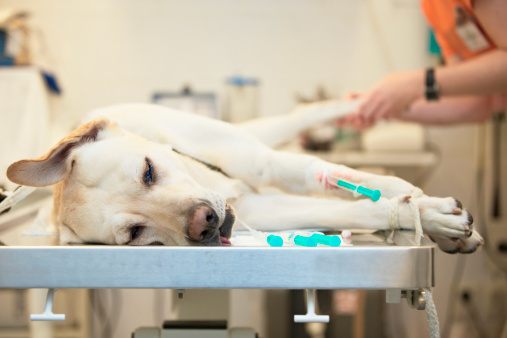“This post contains affiliate links, and I will be compensated if you make a purchase after clicking on my links.”
We’re all familiar with the need for human blood donors, many of us have given blood or do so regularly, knowing that our healthy blood could mean the difference between life and death for another person in need. But, many people don’t realize that dogs need blood donors, too.

With a short visit to your veterinarian every few months, your dog can be a hero.
Just like humans, when dogs (and cats!) have an injury, become ill, or need surgery, a blood transfusion could save their lives. Without the generosity of canine blood donors, many of those pets would not survive.
That’s why more and more pet parents, along with their veterinarians are getting on board with donating their healthy dog’s blood. A single canine blood donation can be used to save up to 4 dogs’ lives! There are 3 canine blood banks in the nation, and they’re are all in low supply.
Can Any Dog Give Blood?
Requirements for canine blood donors may vary, but typically are as follows:
– A healthy dog weighing 55 pounds or more;- Between the ages of 1 and 6 years old;
– Must be spayed or neutered, with no history of pregnancy;
– Must have no history of disease and not taking any medications;
– Must be taking a heartworm preventive;
– Must be current with veterinarian’s preventive health and vaccination schedule.
– It is recommended that candidates be well-behaved and friendly to avoid the need for sedation.
Because canine blood only has a shelf life of about a 30 to 35 days, supplies need to be constantly replenished. When a donor dog is approved to give blood, he usually donates about every month-and-a-half to two months.
What is the Process Like For My Dog?
A typical donation takes about 10 to 30 minutes. The dog is placed on a table, normally laying on his side, while a technician gives him lots of love and attention. A small patch of fur on the dog’s neck is shaved, and a tiny needle is used to collect the blood. Most dogs don’t feel a thing, and are just thrilled for the extra love and attention.
As soon as blood is drawn, the dog’s body begins to produce more to replace it. Donors are given plenty of water and yummy snacks immediately after donating. While some dogs may be sluggish or weak after donating, others have no reaction at all – every dog is different. Overall, dogs recover much more quickly from a blood donation than humans do.
Many blood donor programs offer special perks for donors, too. Those perks range from free veterinary services, to gift certificates, discounts, and more. But, the biggest perk of all is to help save dogs’ lives!
What if your dog needed blood in an emergency, but none was available? Talk to your veterinarian about becoming a canine blood donor!



















Pingback: Did you know your pet can save lives by donating blood? - University Animal Hospital
Dorene
Jun 14, 2017 at 5:36 pm
Can a dog use human blood if it was needed? Or if there a difference between human and animal blood. If it would same my animal I would gladly donate for that reason.
Sandra Dent
Jan 20, 2017 at 3:28 pm
Both of our dogs donate. Our canine blood bank is the Blue Ridge Veterinary Blood Bank (brvbb.com) out of Purcellville, VA.
The donor dogs are all healthy pets that live normal lives. Some are active in dog shows or events, others are therapy and visitation dogs and many are just family pets. There are a few requirements to be met before your pet can donate, and they keep close touch with your veterinarian.
Our boys look forward and are very excited and happy to donate. Trust me, a 60 or 70 lb, Golden Retriever that does not want to do something, cannot be made or forced to do it. It is always a positive experience for them.
Gage
Apr 7, 2016 at 3:09 pm
Good, finally we can save our FBFFL (Furry Best Friends For Life) after they had a horrendous accident. Thank you soooooooo much vets for caring for our bundles of joy and love!
Maresa
Aug 26, 2015 at 7:54 am
I have three dogs that donate. It’s though a great program. Thankfully the program we donate though doesn’t require the dogs to be spayed/neutered. It’s foolish to eliminate perfectly healthy dogs, just because they aren’t spayed/neutered. You are ruling them out and their owners who may want to help because of that, is wrong. Just because the dog (s) aren’t neutered doesn’t make them less healthy nor does it say their owners are irresponsible.
K9 of Mine
Jul 26, 2015 at 3:16 pm
I had no idea dogs could give blood! Makes sense that there would be a need for it though. I wonder if vets can collect blood while dogs are put under for other procedures like dental cleanings? That’d be convienent.
dogcareguidelines.net
Aug 29, 2014 at 10:41 pm
Donor animals should be checked by a veterinary surgeon that they are fit and healthy enough before making a blood donation, in which case the risks of donation are very small. Thanks for sharing! This is very helpful!
Jennifer Pattini
Apr 28, 2014 at 6:38 pm
Even though it was too late for my boy, it might of been an option if Diego wasn’t in such bad condition, unfortunately, if it would of helped, it wasn’t available. This is extremely important
Amy
Feb 16, 2014 at 6:52 pm
Hello,
My dog had Lyme disease about 5 years ago. She still shows positive on the test but it is not an active infection. Can she donate?
Michelle Botkin
Feb 3, 2014 at 5:09 pm
I found out two local vets have a barn full of dogs that are kept in cages for their blood. Also, cats. I heard it’s mostly greyhounds. They sell the blood and one vet does only that, now. I have talked with a past health dept. officer who saw it with her own eyes because they had to be inspected. She said there were cages stacked the length of the barn 4-5 deep. Is this common or necessary? I’m sick about it, but don’t know if there’s anything I can or should do. It’s as bad as puppy mills. Why is one dogs life more important than another’s? Greyhounds are so sweet. They’re website says they’re socialized. Yeah, right. We have taken our dogs to them for years. They have a website. They’re in Brownstown, IN. Dr. Ron Harrison and Dr. Bryant. (Don’t know his first name.) Can you give me your opinion and advice?
Thanks,
Michelle Botkin
[email protected]
Brandy Arnold
Feb 14, 2014 at 2:47 pm
Hi Michelle,
Unfortunately, there are several states in the country that do not allow household pets to be blood donors. It sounds like your state may be one of those. In these states, dogs (usually Greyhounds, for some reason) are kept as living donors to supply blood as needed.
However, they don ‘t spend their entire lives in these barns and are usually adopted out to loving homes after about a year of donating.
Melissa
Apr 23, 2015 at 7:41 pm
I don’t know this for a fact, but it seems likely that retired racing Greyhounds would explain why Greyhounds tend to be the breed typically found in this situation. Having adopted two retired racers and seeing the inside of an Alabama Greyhound racing kennel I was heartbroken to learn that many of the kennel owners don’t care about their animals at all. Unless they are racing or exercising they are kept in small cages, unsocialized, the majority have rotting teeth even at the young age of 3-4, so I can easily see these types of owners turning their retired racers over to life in a cage.
LYNDA Dellinger
Feb 1, 2014 at 5:49 pm
I have wondered if my dog’s blood could help another with a copperhead snake bite. She has been bit twice. The first time she built up enough antibodies that the second time she didn’t even swell
linda harling
Jan 31, 2014 at 11:45 pm
i will check it out with our vet.